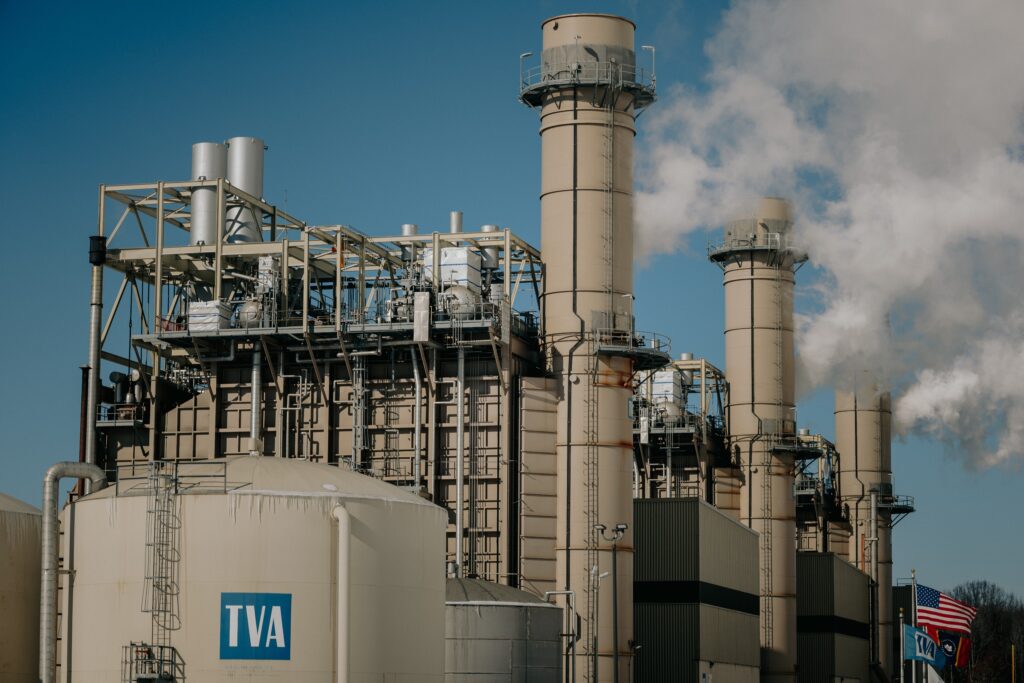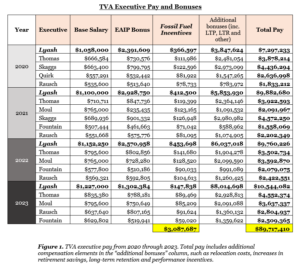
Leadership positions at the Tennessee Valley Authority are the most lucrative government jobs in the U.S.
Since 2020, the top six executives at TVA have collectively banked nearly $90 million.
Part of those salaries came from decisions to put more fossil fuel infrastructure in the Tennessee Valley, and residents essentially signed the checks through their electricity bills, according to a new report by the Center for Biological Diversity.
“People who rely on TVA for power are the ones losing out. They’re continuing to pay executives who are making decisions contrary to the public good,” said Gaby Sarri-Tobar, an energy justice campaigner at the center.
More: TVA proposes 8th gas plant in 3 years | WPLN News
Between 2020 and 2023, TVA executives were awarded about $3.1 million in bonuses for decisions to expand fossil fuel infrastructure. This is because TVA has “performance metrics” that incentivize fossil fuel deployment. So, TVA’s recent decisions to build new methane gas plants created these bonuses, according to the report.
 Courtesy Center for Biological Diversity
Courtesy Center for Biological Diversity Since 2020, the top six executives at the Tennessee Valley Authority banked nearly $90 million while pushing fossil fuels.
TVA is 100% ratepayer-funded
TVA is owned by the federal government. It is considered a public utility because it is fully funded by ratepayers. Residents across the seven-state Tennessee Valley region pay monthly electricity bills to local power companies, like the Nashville Electric Service, which are locked into contracts with TVA. Those companies then pay TVA.
“That money goes to TVA and goes to fill the pockets of these multimillionaire executives,” Sarri-Tobar said.
TVA management is not elected, and the current bonus structure does not incentivize them to protect other people’s health, finances or environment, according to the report. More than 80% of TVA executive salaries come from bonuses, and, among the many metrics fueling them, there are no metrics that incentivize renewable energy.
TVA CEO Jeff Lyash made the most profit. Since joining the utility in 2019, Lyash has taken home more than $37 million. In the four years analyzed in the report, he made nearly $1.4 million for decisions to add more fossil fuels to the grid.
Lyash himself finalized decisions on the two biggest gas projects at the Cumberland and Kingston sites, despite complaints from community members, local officials and federal agencies like the Environmental Protection Agency. For the Kingston decision, made earlier this month, Lyash could get a bonus of $400,000 this year, according to the report.
“There’s a conflict of interest there,” Sarri-Tobar said.
More: TVA is a monopoly. A board is supposed to curb that power. Is it? | WPLN News
The fossil fuel buildout, if allowed to continue, will have serious consequences for the planet and people in the U.S.
Gas plants are part of a system: Methane is fracked from deep underground — often in the Appalachia region — transported across pipelines, run through compressor stations, and then burned at turbines. This process emits pollution across the system that heats the planet, worsens some extreme weather and directly harms living organisms, air and water. For people, these impacts can range from premature births to cancer and premature death.
The Center for Biological Diversity is now asking the TVA Board, the utility’s main regulator, to redesign how it awards bonuses to executives, with a focus on measures like increased renewable energy deployment, home weatherization in vulnerable communities and energy efficiency upgrades.
The TVA Board meets in Nashville on May 9. Before the meeting, community groups and climate activists, including author Bill McKibben, will gather for a rally in Centennial Park on May 8 at 4:30 p.m.
Why have some TVA executive salaries been secret?
In recent years, federal officials have criticized TVA for its lack of transparency on executive salaries.
In 1995, Congress removed a requirement to disclose the management structure and salaries of TVA executives. Last month, Reps. Steve Cohen, D-Tenn. and Tim Burchett, R-Tenn. got the U.S. House to pass the “TVA Salary Transparency Act,” which would reinstate TVA’s annual reporting requirement to Congress on how it’s paying its top executives and management beyond the five highest-paid employees. This legislation was passed after Lyash refused to disclose salary information during a congressional hearing last year.
The Center for Biological Diversity found information about TVA executive salaries through the utility’s financial filings to the U.S. Securities and Exchange Commission.
TVA declined to comment on the report.
Clarification: This story has been updated to reflect that the “TVA Salary Transparency Act” addresses the secrecy of salaries beyond the five highest-paid employees at TVA.

